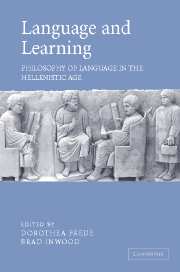Book contents
- Frontmatter
- Contents
- List of contributors
- Preface
- List of abbreviations
- Introduction
- 1 The Stoics on the origin of language and the foundations of etymology
- 2 Stoic linguistics, Plato's Cratylus, and Augustine's De dialectica
- 3 Epicurus and his predecessors on the origin of language
- 4 Lucretius on what language is not
- 5 Communicating Cynicism: Diogenes' gangsta rap
- 6 Common sense: concepts, definition and meaning in and out of the Stoa
- 7 Varro's anti-analogist
- 8 The Stoics on fallacies of equivocation
- 9 What is a disjunction?
- 10 Theories of language in the Hellenistic age and in the twelfth and thirteenth centuries
- References
- Index nominum et rerum
- Index locorum
7 - Varro's anti-analogist
Published online by Cambridge University Press: 23 November 2009
- Frontmatter
- Contents
- List of contributors
- Preface
- List of abbreviations
- Introduction
- 1 The Stoics on the origin of language and the foundations of etymology
- 2 Stoic linguistics, Plato's Cratylus, and Augustine's De dialectica
- 3 Epicurus and his predecessors on the origin of language
- 4 Lucretius on what language is not
- 5 Communicating Cynicism: Diogenes' gangsta rap
- 6 Common sense: concepts, definition and meaning in and out of the Stoa
- 7 Varro's anti-analogist
- 8 The Stoics on fallacies of equivocation
- 9 What is a disjunction?
- 10 Theories of language in the Hellenistic age and in the twelfth and thirteenth centuries
- References
- Index nominum et rerum
- Index locorum
Summary
In the Summer of 47 bc Varro promised to dedicate a large and important work to Cicero (Att. 13.12.3 = 13.24.3 Kasten). In mid 45 Cicero was still waiting for the fulfilment of Varro's promise, and his irritation over this delay may have caused him not to accede immediately to Atticus' advice to dedicate a work to Varro. Scholars agree that the large work Varro intended to dedicate to Cicero was the treatise De lingua Latina, which in its eventual twenty-five books was certainly weighty enough. It was also appropriate as a gift to Cicero, offering both theoretical discussions of the methods to be used in determining linguistic correctness and counsel on how to apply the methods deemed best in practice.
Varro organised his work according to a three-fold division of speech into the ‘imposition’, ‘flexion’, and ‘combination’ of words (8.1). For each of the first two of these, corresponding to the study of etymology and of analogy in inflection-derivation (or ‘flexion’: declinatio, Greek klisis), Varro wrote six books, the first three dealing with the discipline itself – one arguing against the existence and utility of such a discipline, one arguing for the discipline, and one expounding it – and the next three comprising applications of the discipline. Since we know, at least for the second century ad, that there were arguments for and against the existence of a discipline of syntax, it is likely that the last section of the work, that on syntax, followed a similar pattern, only at twice the length.
Information
- Type
- Chapter
- Information
- Language and LearningPhilosophy of Language in the Hellenistic Age, pp. 210 - 238Publisher: Cambridge University PressPrint publication year: 2005
Accessibility standard: Unknown
Why this information is here
This section outlines the accessibility features of this content - including support for screen readers, full keyboard navigation and high-contrast display options. This may not be relevant for you.Accessibility Information
- 46
- Cited by
